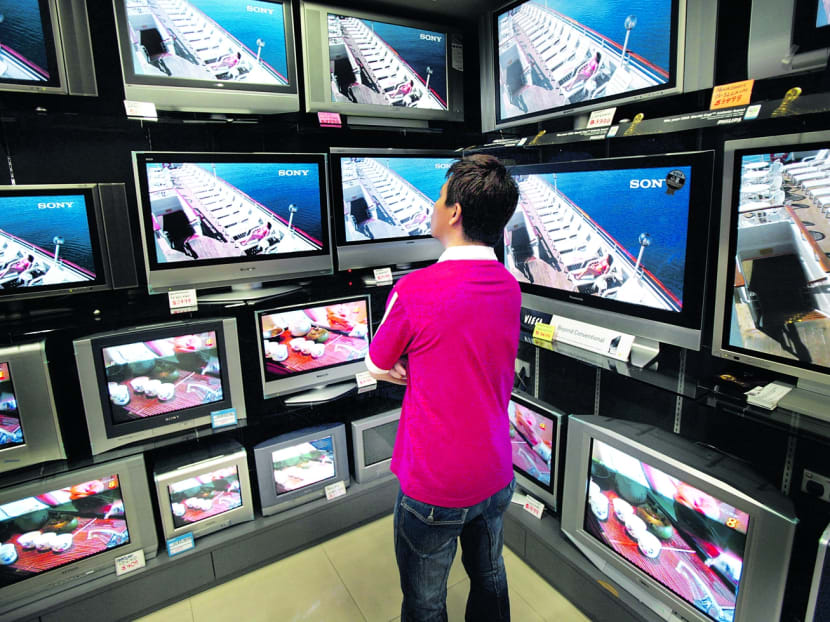Spike in shops that make false claims to draw customers
SINGAPORE — Drawn to the heavily-discounted price for a television set at a roadshow promotion, Ms Annabel Choi, 36, promptly put down a deposit for what she was told was limited stock.


SINGAPORE — Drawn to the heavily-discounted price for a television set at a roadshow promotion, Ms Annabel Choi, 36, promptly put down a deposit for what she was told was limited stock.
Just three days before she was to receive her purchase, however, a salesperson from the well-known electronics store in Kallang called to say the model she had ordered was no longer available, even though the company had collected the balance payment from her two weeks earlier.
The communications executive was offered a newer model for an extra S$300; she negotiated it down to S$100.
Businesses engaging in such “false claims” practices — not fulfilling orders for goods and services they initially promised were available, or asking for additional payments later — are on a sharp rise, triggering the concerns of a consumer watchdog.
In only one year, complaints of such cases surged nearly ten-fold, from five in 2012 to 48 last year, said the Consumers Association of Singapore (CASE). The upward trend looks set to continue — 29 cases were reported in the first three months of this year alone.
“False claims” are categorised as an unfair practice under the Consumer Protection (Fair Trading) Act.
Once rampant only in the beauty industry — asking customers who have signed up for packages to make top-ups for certain treatments — it appears such unethical sales tactics have been creeping into other industries, such as electronics, furniture, automobiles and travel, in recent years.
CASE executive director Seah Seng Choon attributed the increase to better awareness of consumer protection laws. He added that CASE has helped some affected consumers get refunds.
“Consumers should make sure to put down in writing that the deposit was paid and that the shop would reserve the item for them. They should not pay the full amount before the item has been delivered,” Mr Seah said.
Last year, there were four cases in the electrical and electronics industry, for example, up from one case in 2012. Most of these involved neighbourhood shops, said CASE.
Businesses in the electrical and electronics industry interviewed said they do not condone or engage in such “bait-and-switch” sales tactics.
Some cited reasons orders can end up being unfulfilled, but insisted they did not set out to deceive customers.
A product consultant at one electronics store, for instance, said stock kept at the warehouse is delivered to customers on a first-come-first-serve d basis, so even if a deposit has been paid, there may be no stock left if the delivery date is a few months later.
He added that the onus is on the salesperson to make this clear to customers before they pay or take the products to the store for safekeeping, but acknowledged that it depends on individual staff.
Ms Loo Pei Fen, head of marketing at IT retailer Challenger, said: “We do not advertise any heavy price discounts that are gimmicky with long lines of disclaimers or promotion exclusions ... If a particular product is out of stock, customers are always aware of when it will become available (or if it has been discontinued) at the point of transaction.”
The director of the store from which Ms Choi had the unpleasant experience told TODAY over the phone that unforeseen circumstances sometimes arise, such as when some sets are found to be faulty and there are no replacement sets because the manufacturer has discontinued that model.
“So we will try to work with the brand and the customers to see how to settle this, such as giving a different model and trying to keep at the same price,” he said.
But for items such as televisions, the price difference between old and new models can be quite big, he noted, adding that their solution is to either offer a very good price for the new model or give a refund.
Ms Choi said she had to fork out the top-up because she had scheduled for cable television and Internet wiring installation.
“I was assured repeatedly that there was definitely stock left at the warehouse, and they would hold it for me. Even if it was discontinued, the set should still be available or I wouldn’t have bought it in the first place,” she said. “It’s false advertising and very misleading.”






